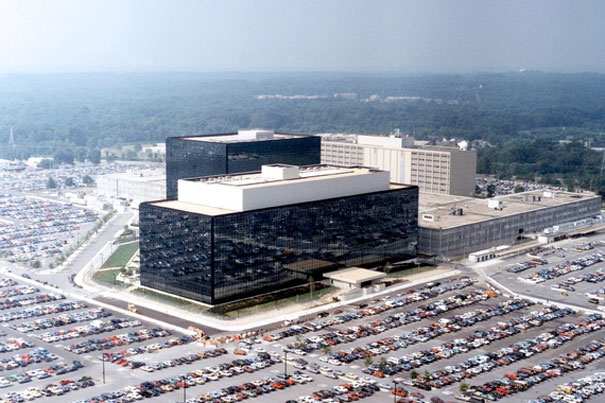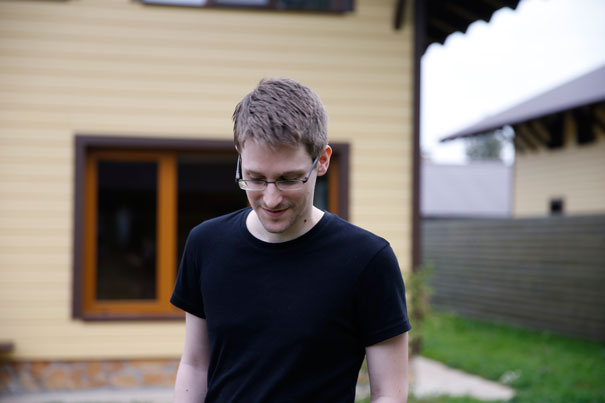

This article is published in partnership with F-Secure
On 7 October, 1989, Soviet tanks ran through the streets of East Berlin in front of the leader of the German Democratic Republic, Erich Honecker to celebrate the Communist regime.
Six months previously, Tim Berners-Lee, a scientist at CERN wrote a proposal to his boss for a new information management system. In small, cautious handwriting at the top his boss had remarked, “Vague, but exciting”. This proposal would become the World Wide Web.
Just as Honecker could not foresee the collapse of Berlin Wall, nor could anyone predict how essential the World Wide Web would become to our everyday lives.
These are two moments of freedom, just six months apart that have shaped the modern world. A third such momentous day – the last day of mass digital surveillance will one day be upon us.
It won’t happen by accident. As citizens, we need to make mass population surveillance as unacceptable as the use of landmines, or the use of CFCs. The harm that mass population surveillance does to the fabric of our society must be debated and we will need to persuade our political leaders that, in amongst all their other priorities, that surveillance reform is essential. This won’t be easy. The harm is mostly invisible, like passive smoking, or the hole in the Ozone layer. Yet, with concerted action we can, like in these two examples, make a difference.
Here is how we can end digital surveillance.

We would not be having this debate if it were not for an American security contractor, Edward Snowden. Snowden blew the whistle on programmes that had expanded the scope of surveillance beyond anything imaginable by politicians or even the public.
The US Congress and Senate were not told that tens of millions of citizens had been placed under surveillance by the NSA. GCHQ in the UK had not informed
Parliament that it was actively capturing all the data from undersea cables off the coast of Cornwall. The NSA was monitoring the phone calls of German Chancellor Angela Merkel. All these programmes were shrouded in secrecy and not subject to normal democratic oversight. Politicians suspended their critical faculties when it came to the work of the intelligence agencies. The agencies were put beyond scrutiny - and as a result the scale of their ambition grew unchecked until they began to tell each other they could “master the internet”.
Snowden acted alone and took sole responsibility for his actions. In Laura Poitras’ film, CITIZENFOUR, she captures the moment Snowden decides to go public and reveal himself as the NSA whistleblower. Snowden’s actions were motivated by an early recall of the potential the internet had. He remembered the days when students would debate with nuclear physicists online, when people were using the Internet for experiments to create new currencies, new ways of communicating and radical ways of doing business.
“I remember what the internet was like before it was being watched, and
there's never been anything in the history of man that's like it.”
- Edward Snowden
Surveillance chills this openness; it makes us restrict our free speech. A 2013 survey of writers by PEN American Center found that 73% of respondents said they have “never been as worried about privacy rights and freedom of the press as they are today” with nearly 1 in 6 avoiding writing or speaking on a particular topic due to their fears over surveillance. A further PEN survey in 2014 found 61% of writers in “not free” countries self-censored due to the risk of surveillance. This is perhaps unsurprising. What is perhaps more concerning is that even in countries considered free, a significant 34% of writers were self-censoring due to surveillance.
We have to reclaim our right to free expression and privacy.
Campaigns can change the world. There is no inevitability to the status quo.
Landmines were once just another weapon in humanity’s wide arsenal of ways to murder. They maimed over a million people and were killing 26,000 people a year before the landmine ban came into force. Now that figure is 4,000 people per year and falling. This is thanks to a coalition of over 100 NGOs who came together in 1991 to try and secure a global prohibition on the use of landmines.
In the face of opposition from 3 of the 5 UN Security Council permanent members (China, Russia and the USA), 80 countries still worked together and committed to a global prohibition.
At a global level much has happened since the Snowden revelations that should
give us hope that our campaigning can change the world. In just over a year and a half, 416 international civil society organisations have backed the 13 “Necessary and Proportionate Principles” that aim to provide a benchmark to help states reform. On 18 December 2013, the UN General Assembly passed ‘The right to privacy in the digital age’ opening up an avenue for the 13 principles to be considered as components of the fundamental right to privacy. This gives global civil society a real opening.
The Don’t Spy On Us campaign has distilled these 13 principles into six principles that should guide the law in the UK:
1. NO SURVEILLANCE WITHOUT SUSPICION
Mass surveillance must end. Surveillance is only legitimate when it is targeted, authorised by a warrant, and is necessary and proportionate.
2. TRANSPARENT LAWS, NOT SECRET LAWS
The Government is using secret agreements and abusing archaic laws. We need a clear legal framework governing surveillance to protect our rights.
3. JUDICIAL NOT POLITICAL AUTHORISATION
Ministers should not have the power to authorise surveillance. All surveillance should be sanctioned by an independent judge on a case-by-case basis.
4. EFFECTIVE DEMOCRATIC OVERSIGHT
Parliament has failed to hold the intelligence agencies to account. Parliamentary oversight must be independent of the executive, properly resourced, and able to command public confidence through regular reporting and public sessions.
5. THE RIGHT TO REDRESS
Innocent people have had their rights violated. Everyone should have the right to challenge surveillance in an open court.
6. A SECURE INTERNET FOR ALL
Weakening the general security and privacy of communications systems erodes protections for everyone, and undermines trust in digital services. Secret operations by government agencies should be targeted, and not attack widely used technologies, protocols and standards.
We need to persuade our political leaders that “mastering the Internet” is not an acceptable aim. Our freedom to think, write, converse openly – or in private – is a freedom worth preserving. It’s time for governments to support action at the UN to adopt the 13 principles as global principles. In the UK, we need new legislation to roll back surveillance. We can make the last day of surveillance happen.